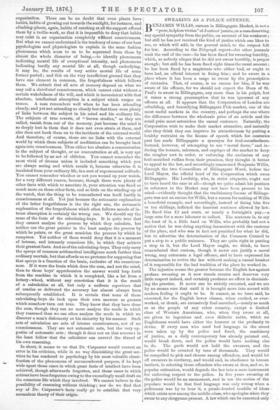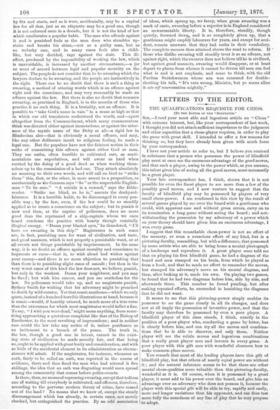SWEARING AS A POLICE OFFENCE.
BENJAMIN WILLIS, carman in Billingsgate Market, is not a "poor, helpless victim" of Justices' justice, or a man deserving any special sympathy from the public, on account of his weakness ; but still he has not received the kind of justice which one likes to see, or which will add, in the general mind, to the respect felt for law. According to the Telegraph report—for other journals omit the end of the case—he has been fined for swearing horribly, which, as nobody alleges that he did not swear horribly, is proper enough; but still he has been fined eight times the usual amount ; he has been fined by a magistrate who either had, or ought to have had, an official interest in fining him ; and he swore in a place where it has been a usage to swear by the prescription of centuries. That, of course, is no excuse for him, if he was aware of his offence, for we should not expect the Dean of St. Paul's to swear in Billingsgate, any more than in his pulpit, but it raises a strong presumption that he was ignorant of any offence at all. It appears that. the Corporation of London are rebuilding, and beautifying Billingsgate Fish-market, one of the most useful markets in the country, and perhaps the one where the difference between the wholesale price of an article and the retail price most astonishes the casual customer. Naturally, the Corporation wish to make their market attractive, and naturally also they think they can improve its attractiveness by putting a healthy restraint on the license of speech which for centuries , past has made Billingsgate a synonym for foul-mouthedness. Instead, however, of attempting to use "moral force," and in- ducing the tenants, salesmen, and employes of the market to keep the rougher sort in order, or enforcing the exclusion of any foul-mouthed ruffian from their premises, they thought it better to appeal to the law, and accordingly summoned Benjamin Willis, through the two Councillors of Billingsgate Ward, before the Lord Mayor, the official head of the Corporation which owns Billingsgate. His Lordship, who, in strict etiquette, ought not to have heard the case.at all—though we quite admit his position in reference to the Market may not have been present to his mind—evidently thought that the traditionary license of Billings- gate was not an excuse for Willis, but a reason for making of Willis a beneficial example, and accordingly, instead of fining him five or ten shillings, inflicted the heaviest sentence allowed by law. He fined him £2 and costs, or nearly a fortnight's pay,—a large sum for a mere labourer to collect. The sentence is, to say the least of it, a little hard on Willis, who probably had not a notion that he was doing anything inconsistent with the customs of the place, and who was in fact not punished for what he did, but to advertise the determination of the Common Council to put a stop to a public nuisance. They are quite right in putting a stop to it, but the Lord Mayor ought, we think, to have remembered that custom, though it never can justify a moral wrong, may extenuate a legal offence, and to have expressed his determination to revive the law without makings casual breaker of it responsible for the bad tradition of the place he worked in.
The injustice seems the greater because the English law against profane swearing as it now stands creates and deserves very little respect indeed, and certainly produces no effect in diminish- ing the practice. It never can be strictly executed, and we are by no means sure that until it is brought more into accord with modern feeling it ought to be. It cannot, as we have said, be executed, for the English lower classes, when excited, or over- worked, or drunk, are excessively foul-mouthed,—nearly as much so as the people of any other country, except a limited class of Western Americans, who, when they swear at all, are given to ingenious and even didactic oaths, which no Englishman would have either the humour or the profanity to devise. If every man who used bad language in the street were taken up by the police and fined, the machinery of justice, as a daily contemporary has already pointed out, would break down, and the police would have nothing else to do. The gaols would not hold the swearers, and the police would be counted by tens of thousands. They would be compelled to pick and choose among offenders, and would let off swearers in corduroy, and would end, in obedience to human instinct, in selecting those offenders who swore at them, and so, in popular estimation, would degrade the law into a mere instrument for enforcing respect to the police. In five years swearing at the police would be an amusement, and in ten the notion of the populace would be that foul language was only wrong when a policeman was by to hear it, a puzzle-headed muddle of ideas which exists now among the middle-class, who apologise when they swear to any clergyman present. A law which can be executed only
by fits and starts, and as it were, accidentally, may be a capital law for all that, just as an etiquette may be a good one, though it is not enforced once in a decade, but it is not the kind of law which ameliorates a popular habit. The man who offends against it and is punished feels as the man does who stumbles up- stairs and breaks his shins,—not as a guilty man, but as an unlucky one, and in many cases feels also a child- like, but very decided, rage against the stair. This ill- effect, produced by the impossibility of working the lair, which is unavoidable, is increased by another circumstance,—a jar or want of accord between legal and popular morality on the subject. The people do not consider that to be swearing which the lawyers declare to be swearing, and the people are instinctively in the right. There can be no doubt that there is such a thing as swearing, a method of uttering words which is an offence against right and the conscience, and may very reasonably be made an offence against the law. But there is also no doubt that common swearing, as practised in England, is in the mouths of those who practise it no such thing. It is a brutality, not an offence. It is possible to "take God's name in vain" in a sense as high as that in which our old translators understood the words, and—apart altogether from the Commandment, which many commentators think was directed either against incantations, or against the utter- ance of the mystic name of the Deity at all—a rigid law in Hindooism also—that is obviously a moral offence, and may, like any other deliberate insult to religious feeling, be made a legal one. But the populace have not the faintest notion in their oaths of committing this offence against either God or man. They use oaths, often horrible to cultivated ears, as senti- mentalists use superlatives, and will swear as hard when excited by the doing of a good deed as when working them- selves up to the commission of a bad one. They attach absolutely no meaning to their own words, and will call on God to "strike them" this, that, or the other, in mere assent to a proposition, as mechanically as the German says " So " or the respectable English- man " To be sure." "A suicide is a coward," says the Bible- reader. " Strike me blind, so he is," assents the dockyard- labourer. It is a horrible habit, to be discouraged in every pos- sible way ; by the law, even, if the law could be so steadily applied as to create a conscience on the subject ; but to punish it now and then, at the caprice of policemen, does no more good than the reprimand of a ship-captain whom we once heard condemn the practice with hearty though comically illogical energy. "Damn your blasted eyes," he thundered, "I'll have no swearing in this ship !" Magistrates in such cases are, in fact, punishing men for want of civilisation, and taste, and good manners, which is not properly a punishable want, or at all events not things punishable by imprisonment. In the same way, it is no doubt an offence against morality and conscience to imprecate or curse—that is, to wish aloud bad wishes against your enemy—and there is no more objection to punishing that than there is to punishing slight cases of assault ; but then in the very worst cases of this kind the law does not, we believe, punish, but only in the weakest. Damn your neighbour, and you may be fined ; but wish him cancer, and you are scatheless for the law. No policeman would take up, and no magistrate punish, Sydney Smith for wishing that his adversary might be preached to death by wild curates. Yet that comic anathema—which we only quote, instead of a hundred horrible illustrations at hand, because it is comic—would, if heartily uttered, be much more of a trae curse than the utterances for which most magistrates would inflict a fine. To say, " I wish you were dead," might mean anything, from some- thing approaching a querulous complaint like that of the Bishop of Barchester, to the most revolting of imprecations ; and in neither ease could the law take any notice of it, unless perchance as an incitement to a breach of the peace. The truth is, the law, though a good one in intent, cannot in the exist- ing state of civilisation be made morally fair, and that being so, ought to be applied with great lenity and consideration, and with as little of the accidental element in its administration as circum- stances will admit. If the magistrates, for instance, whenever an oath, fairly to be called an oath, was reported in the course of evidence, there and then fined the man who had uttered it five shillings, the idea that an oath was disgusting would soon spread among the community that comes before police-courts.
Is there, then, no means of repressing swearing, except that tedious one of waiting till everybody is cultivated, and offences, therefore, according to the perverse modern theory of crime, have ceased out of the land ? No means that we know of, except the steady discouragement which has already, in certain cases, not merely checked, but extinguished the practice. By an odd association
of ideas, which sprang up, we fancy, when gross swearing was a mark of caste, swearing before a superior kin England considered an unwarrantable liberty. It is, therefore, steadily, though quietly, frowned don, and is so completely given up, that a gentleman might employ labourers for years, and except for acci- dent, remain unaware that they had oaths in their vocabulary. The complete success thus attained shows the road to reform. If • those who dislike swearing will steadily treat it as an offence, not against right, which the swearer does not believe till he is civilised, but against good manners, swearing would disappear, or at least depart to places from whence it cannot be driven till men can feel what is and is not emphasis, and cease to think, with the old Puritan Scotchwoman whose son was censured for double- allotting his talk, " It's vara wrong, Minister, but ye mann alloo it sets air conversation mightily."



































 Previous page
Previous page